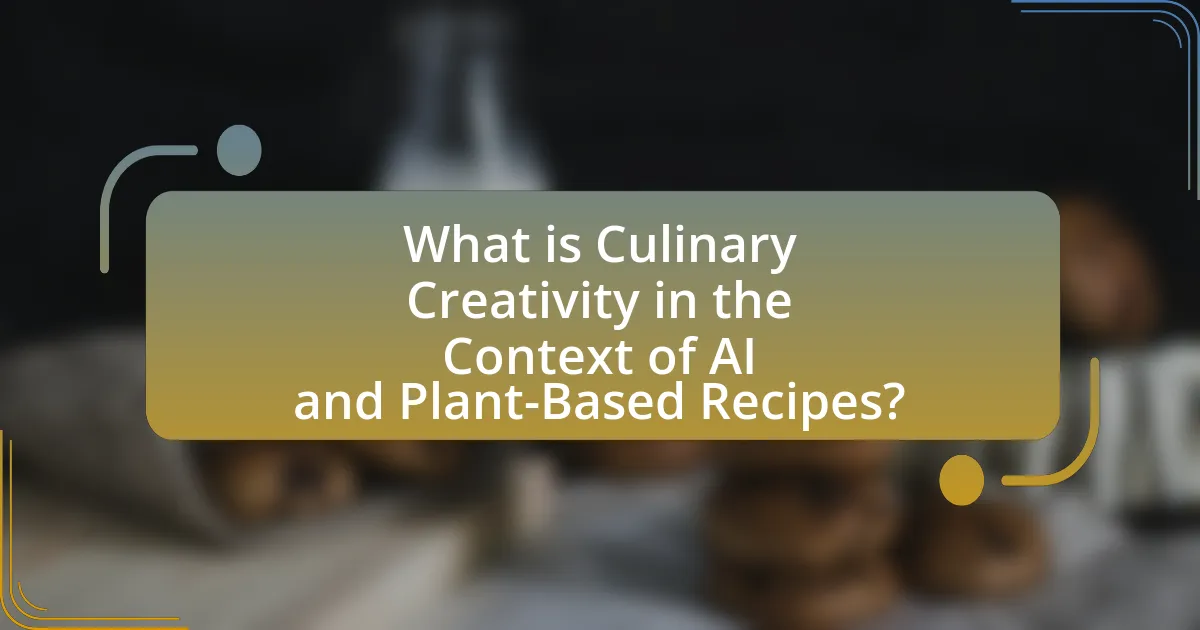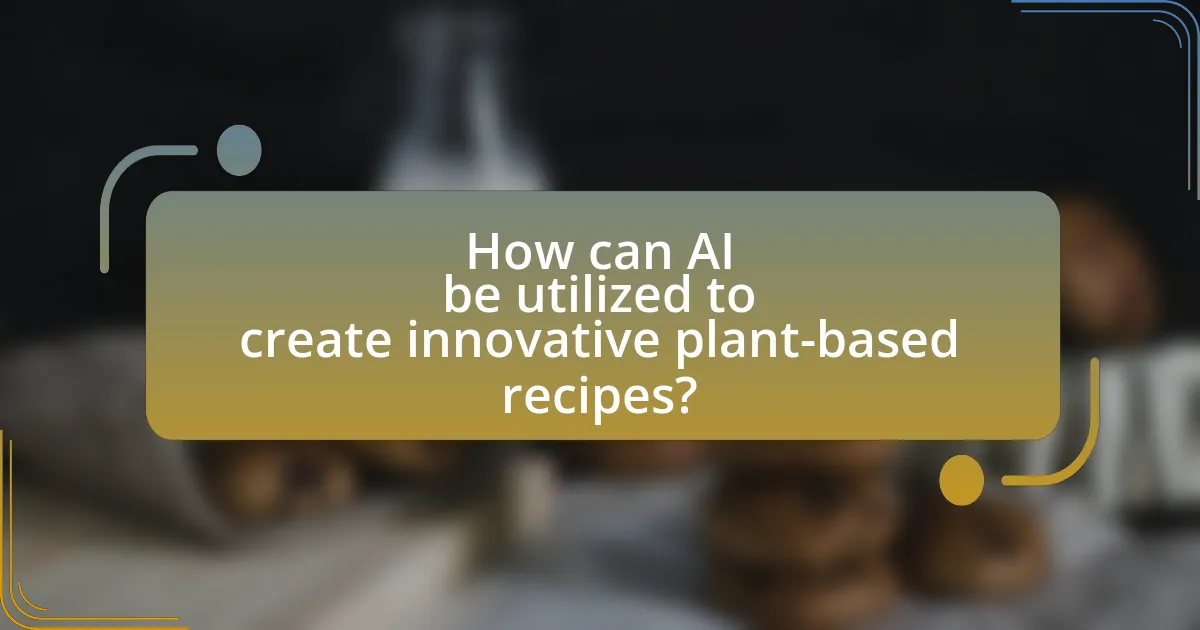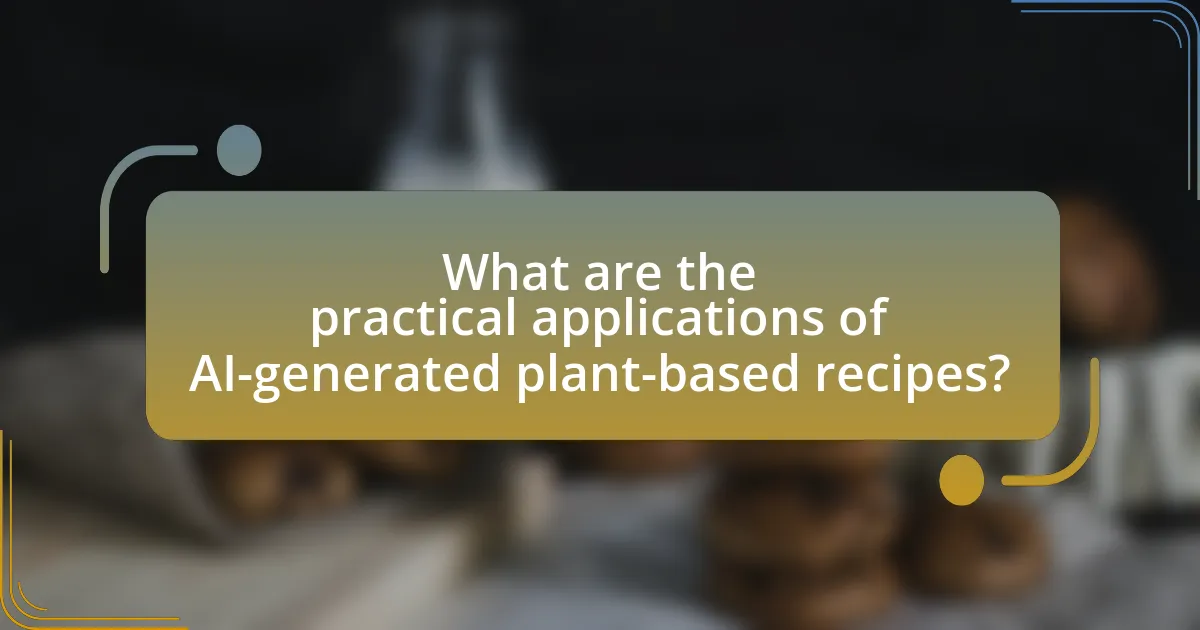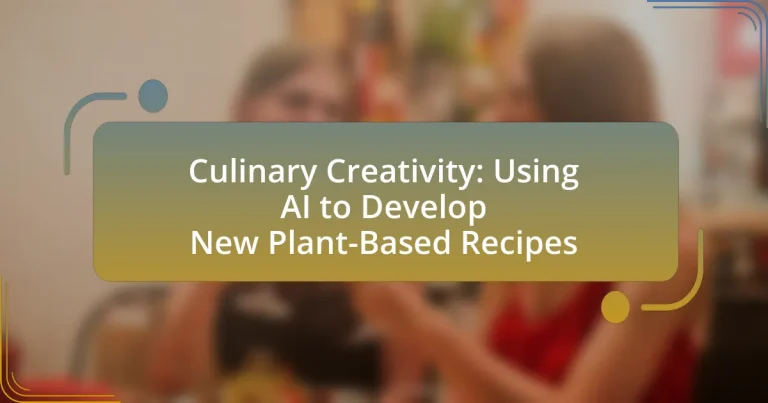Culinary creativity, particularly in the realm of plant-based recipes, is increasingly being enhanced through the application of artificial intelligence (AI). This article explores how AI algorithms analyze extensive datasets of ingredients, flavors, and cooking techniques to generate innovative plant-based recipes, optimize flavor pairings, and cater to diverse dietary preferences. It discusses the various machine learning algorithms employed in recipe development, the health and environmental benefits of plant-based diets, and the practical applications of AI in both home cooking and restaurant settings. Additionally, the article addresses the challenges and ethical considerations associated with AI in culinary arts, providing insights into how chefs can effectively collaborate with AI to expand their creative horizons.

What is Culinary Creativity in the Context of AI and Plant-Based Recipes?
Culinary creativity in the context of AI and plant-based recipes refers to the innovative process of using artificial intelligence to generate, enhance, and optimize plant-based culinary creations. AI algorithms analyze vast datasets of ingredients, flavors, and cooking techniques to suggest novel combinations and recipes that may not be immediately apparent to human chefs. For instance, a study published in the journal “Nature” demonstrated that AI can predict flavor pairings with over 90% accuracy, enabling the development of unique plant-based dishes that cater to diverse dietary preferences and nutritional needs. This integration of AI not only streamlines recipe development but also fosters creativity by allowing chefs to explore unconventional ingredient pairings and cooking methods, ultimately expanding the culinary landscape of plant-based cuisine.
How does AI contribute to culinary creativity?
AI contributes to culinary creativity by analyzing vast amounts of data to generate innovative recipes and flavor combinations. By utilizing machine learning algorithms, AI can identify patterns in ingredient pairings and cooking techniques, leading to the creation of unique plant-based dishes. For instance, a study by IBM demonstrated that AI systems could predict successful flavor combinations based on existing culinary data, enhancing the creative process for chefs and home cooks alike. This data-driven approach not only inspires new recipes but also allows for customization based on dietary preferences and nutritional needs, thereby expanding the possibilities in plant-based cooking.
What algorithms are used in AI for recipe development?
Algorithms used in AI for recipe development include machine learning techniques such as neural networks, genetic algorithms, and natural language processing (NLP). Neural networks analyze large datasets of existing recipes to identify patterns and generate new combinations of ingredients. Genetic algorithms simulate the process of natural selection to evolve recipes over iterations, optimizing for taste and nutritional value. NLP techniques are employed to understand and generate recipe instructions, making the process more intuitive. These algorithms have been validated through various studies, demonstrating their effectiveness in creating innovative and appealing plant-based recipes.
How does AI analyze flavor profiles and ingredient combinations?
AI analyzes flavor profiles and ingredient combinations by utilizing machine learning algorithms that process vast datasets of culinary information. These algorithms identify patterns in flavor compounds, ingredient interactions, and consumer preferences, enabling AI to predict successful pairings and flavor profiles. For instance, AI systems like IBM’s Chef Watson have been trained on thousands of recipes and flavor pairings, allowing them to suggest novel combinations based on chemical compatibility and historical data. This approach is supported by research indicating that certain flavor compounds, such as esters and terpenes, contribute to perceived flavor harmony, which AI can quantify and analyze effectively.
Why is plant-based cuisine gaining popularity?
Plant-based cuisine is gaining popularity due to increasing health consciousness, environmental concerns, and ethical considerations regarding animal welfare. Research indicates that a plant-based diet can reduce the risk of chronic diseases such as heart disease and diabetes, as highlighted in a study published in the Journal of the American Heart Association, which found that individuals consuming more plant-based foods had a lower risk of cardiovascular events. Additionally, the environmental impact of animal agriculture, which contributes significantly to greenhouse gas emissions, is prompting consumers to seek sustainable alternatives. A report from the Food and Agriculture Organization (FAO) states that livestock production accounts for 14.5% of global greenhouse gas emissions, further driving the shift towards plant-based diets. Lastly, ethical concerns about animal treatment in the food industry are leading many to adopt plant-based eating as a moral choice.
What health benefits are associated with plant-based diets?
Plant-based diets are associated with numerous health benefits, including reduced risk of chronic diseases, improved heart health, and better weight management. Research indicates that individuals following plant-based diets have lower rates of heart disease, hypertension, type 2 diabetes, and certain cancers. For instance, a study published in the Journal of the American Heart Association found that plant-based diets can lower cholesterol levels and improve blood pressure, contributing to overall cardiovascular health. Additionally, a meta-analysis in the journal Nutrients revealed that plant-based diets are linked to lower body mass index (BMI) and reduced obesity rates, further supporting their role in effective weight management.
How does plant-based eating impact the environment?
Plant-based eating significantly reduces environmental impact by lowering greenhouse gas emissions, conserving water, and preserving biodiversity. Research indicates that animal agriculture is responsible for approximately 14.5% of global greenhouse gas emissions, while plant-based diets can reduce an individual’s carbon footprint by up to 50%. Additionally, producing plant-based foods typically requires less water; for instance, producing one pound of beef requires about 1,800 gallons of water, whereas one pound of lentils requires only 600 gallons. Furthermore, plant-based diets promote biodiversity by reducing the demand for land used for livestock grazing and feed crops, which often leads to deforestation and habitat loss.

How can AI be utilized to create innovative plant-based recipes?
AI can be utilized to create innovative plant-based recipes by analyzing vast datasets of existing recipes, ingredient combinations, and flavor profiles. Machine learning algorithms can identify patterns and suggest novel pairings that may not be immediately obvious to human chefs. For instance, AI systems like IBM’s Chef Watson have demonstrated the ability to generate unique recipes by combining ingredients based on chemical flavor compounds, resulting in unexpected yet harmonious dishes. This approach not only enhances creativity but also allows for the exploration of diverse culinary traditions, leading to the development of recipes that cater to various dietary preferences and restrictions.
What are the steps involved in using AI for recipe generation?
The steps involved in using AI for recipe generation include data collection, model training, recipe generation, and evaluation. First, data collection involves gathering a diverse dataset of existing recipes, ingredients, and cooking methods. This dataset serves as the foundation for the AI model. Next, model training utilizes machine learning algorithms to analyze the dataset, identifying patterns and relationships between ingredients and cooking techniques. Following training, the AI generates new recipes by combining learned elements in innovative ways. Finally, evaluation assesses the generated recipes for taste, feasibility, and originality, often involving human taste testers or automated scoring systems to ensure quality and creativity.
How does data collection influence recipe outcomes?
Data collection significantly influences recipe outcomes by providing insights into ingredient interactions, flavor profiles, and consumer preferences. By analyzing data from previous recipes, chefs and food technologists can identify which combinations yield the best taste and texture, leading to more successful dishes. For instance, a study published in the Journal of Food Science demonstrated that data-driven approaches can enhance flavor pairing by utilizing chemical compound analysis, resulting in improved recipe formulations. This evidence shows that systematic data collection not only refines culinary techniques but also aligns recipes with market trends and consumer demands, ultimately enhancing the overall quality and acceptance of plant-based dishes.
What role does machine learning play in refining recipes?
Machine learning plays a crucial role in refining recipes by analyzing vast amounts of culinary data to identify patterns and optimize ingredient combinations. This technology enables chefs and food developers to create innovative plant-based recipes that cater to specific dietary preferences and flavor profiles. For instance, machine learning algorithms can evaluate user feedback and ingredient interactions, leading to improved taste and texture in dishes. Research has shown that AI-driven recipe generation can enhance creativity in cooking, as demonstrated by projects like IBM’s Chef Watson, which utilizes machine learning to suggest unique ingredient pairings based on chemical flavor compounds.
What challenges exist in developing AI-generated plant-based recipes?
Developing AI-generated plant-based recipes faces several challenges, primarily related to ingredient variability, flavor complexity, and cultural context. Ingredient variability arises from the diverse properties of plant-based ingredients, which can affect texture and taste, making it difficult for AI to predict successful combinations. Flavor complexity is another challenge, as plant-based recipes often require a nuanced understanding of how different flavors interact, which AI may struggle to replicate accurately. Additionally, cultural context plays a significant role in recipe development; AI may lack the cultural knowledge necessary to create recipes that resonate with specific culinary traditions or preferences. These challenges highlight the limitations of current AI technology in fully capturing the intricacies of culinary creativity in plant-based cooking.
How can AI overcome limitations in ingredient availability?
AI can overcome limitations in ingredient availability by utilizing data-driven algorithms to suggest alternative ingredients based on nutritional profiles and flavor compatibility. For instance, machine learning models can analyze vast databases of recipes and ingredient properties to identify substitutes that maintain the desired taste and texture, even when specific ingredients are unavailable. Research has shown that AI can effectively recommend alternatives that meet dietary restrictions or preferences, enhancing culinary creativity while addressing supply chain challenges.
What ethical considerations arise from using AI in culinary arts?
The ethical considerations arising from using AI in culinary arts include issues of authenticity, intellectual property, and the potential for bias in recipe development. Authenticity is questioned as AI-generated recipes may lack the cultural and personal significance that traditional cooking embodies. Intellectual property concerns arise when AI systems create recipes that may inadvertently replicate existing dishes, leading to disputes over ownership. Additionally, bias can occur if the AI is trained on a limited dataset, resulting in recipes that do not represent diverse culinary traditions or dietary needs. These considerations highlight the need for careful oversight and ethical guidelines in the integration of AI within the culinary field.

What are the practical applications of AI-generated plant-based recipes?
AI-generated plant-based recipes have practical applications in meal planning, dietary customization, and food innovation. These recipes can assist individuals in creating balanced meals tailored to specific nutritional needs, such as vegan, gluten-free, or low-calorie diets. For instance, AI algorithms analyze vast databases of ingredients and nutritional information to suggest recipes that meet these criteria, enhancing dietary adherence and variety. Additionally, restaurants and food brands utilize AI to develop unique plant-based dishes that cater to evolving consumer preferences, thereby driving innovation in the culinary industry. Research indicates that AI can significantly reduce recipe development time, allowing chefs to focus on creativity while ensuring nutritional value and flavor.
How can restaurants benefit from AI in recipe development?
Restaurants can benefit from AI in recipe development by leveraging data-driven insights to create innovative and appealing dishes. AI algorithms analyze vast amounts of culinary data, including ingredient combinations, flavor profiles, and dietary trends, enabling chefs to experiment with new plant-based recipes that cater to consumer preferences. For instance, a study by the Culinary Institute of America found that AI can predict successful flavor pairings with up to 90% accuracy, allowing restaurants to enhance their menus with unique offerings that attract customers. This integration of AI not only streamlines the recipe development process but also helps restaurants stay competitive in a rapidly evolving food landscape.
What examples exist of successful AI-driven plant-based menus?
Successful AI-driven plant-based menus include those developed by companies like Plant Jammer and IBM’s Chef Watson. Plant Jammer utilizes AI algorithms to create unique recipes based on available ingredients and dietary preferences, resulting in a diverse range of plant-based dishes that cater to various tastes. IBM’s Chef Watson, on the other hand, combines culinary knowledge with machine learning to suggest innovative plant-based recipes by analyzing flavor compounds and ingredient pairings, leading to successful menu items in restaurants. These examples demonstrate the effectiveness of AI in enhancing culinary creativity and developing appealing plant-based options.
How can home cooks utilize AI tools for recipe creation?
Home cooks can utilize AI tools for recipe creation by leveraging algorithms that analyze ingredient combinations, cooking techniques, and flavor profiles to generate innovative recipes. These AI systems can process vast amounts of culinary data, including existing recipes and user preferences, to suggest unique plant-based dishes tailored to individual tastes. For instance, platforms like IBM’s Chef Watson have demonstrated the ability to create novel recipes by understanding the chemical compounds in food, resulting in combinations that might not be intuitive to human cooks. This capability allows home cooks to experiment with new ingredients and methods, enhancing their culinary creativity and expanding their repertoire of plant-based meals.
What are the best practices for integrating AI into culinary creativity?
The best practices for integrating AI into culinary creativity include leveraging data analysis, utilizing machine learning algorithms, and fostering collaboration between chefs and AI systems. Data analysis allows chefs to identify trends and preferences in plant-based ingredients, enhancing recipe development. Machine learning algorithms can generate innovative combinations and flavor profiles based on existing recipes, which has been shown to inspire new culinary creations. Collaboration between chefs and AI systems ensures that human intuition and creativity complement AI-generated suggestions, leading to more refined and appealing dishes. For instance, a study by the MIT Media Lab demonstrated that AI can assist chefs in creating unique recipes by analyzing vast datasets of ingredients and cooking techniques, resulting in novel culinary experiences.
How can chefs collaborate with AI to enhance their creativity?
Chefs can collaborate with AI to enhance their creativity by utilizing AI-driven tools that analyze flavor profiles, ingredient combinations, and cooking techniques. These tools can suggest innovative recipes based on existing culinary data, enabling chefs to experiment with new plant-based ingredients and flavors. For instance, AI systems like IBM’s Chef Watson have demonstrated the ability to generate unique recipes by understanding the chemical compounds in food, which can lead to unexpected yet harmonious flavor pairings. This collaboration not only expands a chef’s creative repertoire but also allows for the exploration of plant-based options that align with current dietary trends and sustainability goals.
What tools and platforms are recommended for aspiring culinary innovators?
Aspiring culinary innovators are recommended to use tools and platforms such as IBM Watson, Google Cloud AI, and Plant Jammer. IBM Watson provides advanced AI capabilities for recipe development and flavor pairing, enabling chefs to create innovative dishes based on data-driven insights. Google Cloud AI offers machine learning tools that can analyze culinary trends and consumer preferences, helping innovators tailor their recipes effectively. Plant Jammer is a user-friendly platform specifically designed for plant-based cooking, allowing users to generate recipes based on available ingredients and dietary restrictions. These tools enhance creativity and efficiency in developing new plant-based recipes.


